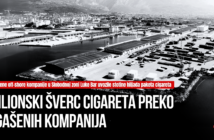The Czech government requested an opinion from the European Commission on Protocol on Cooperation with Montenegro in the Field of Energy and Infrastructure, which defines the construction of Unit II of the thermal power plant in Pljevlja as the main project. This could be another reason why the agreement between the government and Montenegrin Electric Enterprise (EPCG) and the Czech company Skoda Praha on implementation of the project of Unit II construction has been delayed for several months.
Skoda Praha’s last year’s offer worth €338 million was selected as the most favorable one, but earlier it was announced that model of financing of the future energy project was debatable in the negotiations, i.e. the Czechs require that state and EPCG provide the loan guarantees.
The Czech Ministry of Industry submitted the Protocol on Cooperation between the Czech Republic and Montenegro in the Field of Energy and Infrastructure to be discussed at the public debate in September last year and the interested public could submit comments. On the other hand, the Montenegrin government has not discussed the same Protocol at the public debate thus failing to provide its citizens with the opportunity to submit their comments.
The Protocol states that the conceptual design and feasibility study for Unit II were developed as early as in 2012, and that Unit II competitiveness and sustainability are associated with the construction of the undersea cable between Montenegro and Italy.
The accompanying documents published during the public debate in the Czech Republic also state that the procedure for signing the Protocol was launched by the Montenegrin side and indicate that the direct and indirect impact on the Czech budget is envisaged, but no specific details have been provided to that effect.
According to the data MANS Investigation Centre obtained from the Prague-based partner non-governmental organization – Econnect, the Czech Ministry of Industry at the end of last year asked the European Commission to deliver an opinion regarding the Protocol with Montenegro, especially as the project should be implemented on the basis of the international agreement between the two country, i.e. without public procurement procedures.
By early 2016 it was not known whether the European Commission responded to the request of the Czech government, but it is realistic to expect that the further actions will be influenced by the response from Brussels.
Otherwise, the Protocol defines that the two parties will examine the possibilities for the future cooperation in the production of electricity from hydro resources, but also in the cooperation regarding the use of coal reserves in Maoce deposit in Plevlja.
In its offer for the construction of Unit II Skoda Praha has demanded several conditions to be met, where the most significant one is the loan guarantee provided by EPCG and a strategic partner in the newly formed company. Since EPCG has failed to find a strategic partner, it was announced that this role is going to be assumed by the State of Montenegro.
One of the requirements is to develop a fifteen-year business plan for the future unit of the thermal power plant, as well as for EPCG for the same period, but the Czechs oppose to paying dividends of the newly formed company during a fifteen-year period of the loan repayment.
Skoda Praha’s offer indicates that a company which will be entrusted with the management of Unit II will conclude a long-term agreement on coal supply, but the offer did not specify under what conditions this contract would be concluded.
This text is created with the support of the European Union and the US Embassy Podgorica. Network for Affirmation of Non-Governmental Sector – MANS is solely responsible for the contents of this article, and the views taken herein shall not in any case be considered as those of the European Union.
Author: Ines Mrdovic



